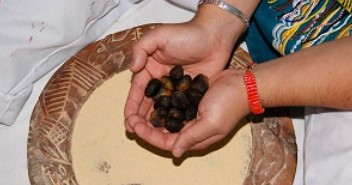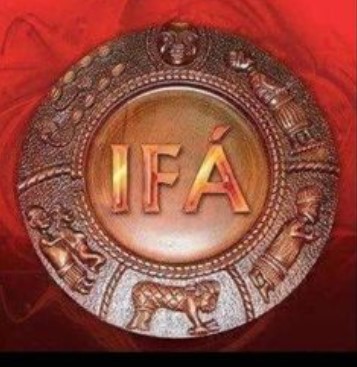All About Ifa: Learn about its signs, how to read them, how to learn, the proverbs, its treatise, and more.
This world we live in is full of things to discover in all areas, from animals to historical secrets to even religions.
When it comes to religions, there are so many that it’s sometimes difficult to count them all. We’re so accustomed to the most well-known ones that we ignore the presence of others. This is the case with Ifá. If you’ve never heard of it, I recommend reading on.
What is Ifá?
Ifá is a fairly complex religion in which babalawos perform invocations to predict the future or clarify certain aspects of life for those who need guidance and protection.
It has no specific origin, but it was systematized in West Africa and is based on the teachings of Orunmila, the spirit of the Yoruba religion Irunmole, who in turn witnesses all creation and destiny.
What are its signs?

In this religion, different signs are used to better understand or to make predictions for a person. There are 256 in total, but I’m going to show you 16, each with a different meaning. They are known as Meji and are as follows:
- Ogbe Meji or Ejiogbe: This is the beginning of everything in heaven and earth.
- Ose Meji: This represents religious secrets.
- Ofun Meji or Oragun: This represents the mysteries and understanding of things.
- Oyeku Meji: means the realm of the dead.
- Iwori Meji: represents divination, intelligence, and the art of prophesying.
- Otura Meji: represents stability and actions.
- Irete Meji: represents reincarnation and past lives.
- Odi Meji: represents perversion and vices.
- Irosun Meji: religiosity and human suffering.
- Ika Meji: sorcery and evil.
- Oturupon Meji: represents illness and harm.
- Oworin Meji: represents spiritual phenomena.
- Obara Meji: represents wisdom and wealth.
- Okanran Meji: confusion and setbacks.
- Ogunda Meji: represents permanent struggle and power.
- Osa Meji: represents the spirit world.
What are the best signs?
Each Ifá sign is important because each one is associated with a story or legend, in which humans are the protagonists. Furthermore, each one possesses characteristics beyond itself and brings with it both good and bad Yoruba experiences.
The best signs are the 16 I mentioned above, but if you want more information, here’s what I’ll show you:
- Ejiogbe: Ifá is the one who places every Babalawo in his place, according to his abilities.
- Odi: Fortune is found in the home.
- Osa: Differences do not exist between us.
- Oyekun: The elders must accept the younger ones.
- Ojuani: No godchild will be scourged.
- Irete: Past lives and reincarnation.
- Otura: The enemy must be defeated with respectability and intelligence.
- Oshe: Every Babalawo must be prudent and modest.
- Ika: The Babalawo’s comfort is in the hands of the enemy.
- Okana: Eleggua is the one who pampers the Babalawo.
- Iwori: Ifá recognizes the Babalawo’s authority and ability to examine everything and do what is right.
- Ogunda: The person in charge of choosing the Ifá priest is Orunmila.
- Otrupon: The woman who lives in the house is the Babalawo’s trusted person. Ofun: Each of the seeds planted will have its respective harvest.
- Obara: Each pact agreed upon will be opposed by the Babalawo.
- Iroso: Ifá is the one who crowns and must protect the crown.
How to learn Ifá?
Obviously, since it’s a completely distinct religion from Catholicism, there may be many things you don’t understand. To help you acquire this knowledge, I recommend doing the following:
- Use the tables to understand each of the signs. Remember there are 256 in total, but you can start with the most important ones I mentioned above.
- Learn each of the names to avoid confusion.
- Read each of the prayers carefully because this helps you understand the meanings.
- Read the signs from right to left.
How to read the signs?
If you are new to this religion, it’s normal that you don’t know how to read the signs, but if you want to learn, here’s a step-by-step guide:
- To begin the reading and divination ceremony, the Orula priest takes the seeds and points to each of the signs.
- The person performing the divination must make eight (8) strokes on their sacred Babalawo board, better known as opon Ifá, using Iyefa, the Ifá divination powder.
- Depending on the sign to be read at that moment, the corresponding prayer is performed. These are the ones the Babalawo interprets for the person.
- The celebrant must guide the reading of the signs so that solutions can be provided to the person’s conflicts.
- The divination begins with an Ifá sign, in this case Toyale, who will be in charge of directing the reading.
- The sign that is intended to solve the problem is obtained, the corresponding solution is given, and the person receives Olofin’s message.
- To conclude the reading session, the Otan sign is performed.
What are the sayings of Ifá?

In every religion, we can find proverbs associated with various aspects that usually explain certain factors. Here are a few you should know:
- Want to be at peace, and loneliness finds you.
- Where there’s a will, there’s a way.
- Look ahead and look back; don’t be unprepared.
- Evil comes from the womb.
- Between a man and his wife, no one interferes.
- Curiosity killed the cat.
- Two big noses can’t kiss.
- He who gives bitterness, receives no sweetness.
- Seek to cover yourself as far as the blanket will go.
- The physical deceives people, not the heart.
- Impatience is the distancing of objects.
- What you did wrong, don’t repeat it.
- You win with your mind, you lose with your mind.
- He who repeats evil becomes a habitual criminal.
- He who pretends to be a savior, comes out crucified.
- Long live the saint among the family. The dead man prowls around, looking for someone to grab.
- He who pays what he owes is free.
- He escapes one and falls into the other.
- The ax splits wood, the tongue kills people.
- The tongue is the punishment of the body.
- Better sure things than uncertain ones.
- No one knows what lies in the depths of the sea.
What is the Ifá treatise?
There are many ways in which a religion is known through others, as they are known by other names that help identify them.
In the case of Ifá, you can find it by names like Regla de Osha, Religión Afro-Cuban, Lukumi, Ifá: La Santería, and Animisme. So, if you ever hear these names, you already know they are referring to this specific religion.
There are many religions and cults around the world that you can join. Ifá is one of them, and if you were interested from the beginning, I hope this article has been very useful.
